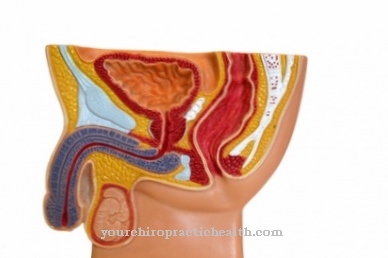The anal phase describes in the psychoanalysis after Sigmund Freud a section of the child's early development. The anal phase follows the oral phase and begins at the age of two. In the anal phase, the excretory functions of the body and how they are dealt with are the focus of children's attention.
What is the anal phase?
For Sigmund Freud, the entry into the anal phase is to be equated with the discovery of the child's pleasure in the process of defecation. At the beginning of the phase, pleasure is gained through excretion of the stool; in the further course, the child also experiences pleasure in the retention of the excretion products. This creates a state between letting go and holding back, which can be characterized by tension.
Function & task
During the anal phase, for the first time, the parents and the environment make demands on the child for cleanliness and restraint. The child experiences that certain things that are created by the child and considered important (in this case the excrement) can be rejected or even sanctioned by the environment.
Depending on the time of bowel evacuation, the caregivers of the child classify it as “good” or “bad”, depending on whether the needs were met according to the specifications of the caregiver or the child. Therefore, the anal phase is seen as the origin of the conflicts over power and control and represents the beginning of “one's own will”.
In the anal phase, the child learns that it can both enforce its own will and to bend to the will of others. The child is also aware of the issue of giving and holding for the first time in the anal phase.
Early pleasure experiences when giving away the excretion products, for example through praise from parents when they successfully walked on the potty, are deeply imprinted on the child's character and can trigger joy in giving things later in life. In a negative sense, repeated feelings of displeasure when giving up the waste products ensure that the child can attract attention later in life due to excessive greed.
In the anal phase, the child equates the excretion process with the corresponding organs and products (stool and urine); there is still no subdivision. If the excretion products are negatively affected by the child’s caregivers, this can manifest itself in the child as feelings of shame and disgust for their own body.
During the anal phase and the associated training in cleanliness, the child is constantly dealing with the external environment. Thereby the ego develops as a mediator between id, super-ego and external reality.
Through this instance, when the anal phase is completed after the third year of life, the child has expanded memory and language skills, a constant personality and the ability to act according to the reality principle. Furthermore, after the anal phase, the child is able to either give in to the instinctual demands of the id or to suppress them.
You can find your medication here
➔ Medicines to calm down and strengthen nervesIllnesses & ailments
If during the anal phase of the child the caregiver evaluates the faeces too strictly or even negatively or threatens to counter constipation, the caregiver's behavior can quickly result in developmental disorders in the child. Wetness or defecation, exaggerated saying no or stuttering are consequences of incorrect handling of the anal phase. The exact opposite of the no-sayer, the eternal yes-sayer, can also have its origin in a disorder of the anal phase.
In children who have not experienced enough satisfaction in the anal phase (for example, through an excessively strict education on cleanliness of the parents), a fixation on the anal phase can be determined as they get older. A fixation arises from frustration, which means frustration, indulgence or insufficient satisfaction. This results in getting stuck in the phase that is experienced as deeply frustrating, which in turn can result in a different personality development.
People who are affected by a fixation on the anal phase still have to struggle with the unsatisfied needs long after they have left the phase. Among other things, this can be the subliminal desire to play with feces. Since people or the environment do not allow and sanction the satisfaction of needs, the psyche sometimes has defense mechanisms to suppress the tendencies. This turns your own desire to get dirty in the exact opposite and shows itself in excessive cleanliness.
Obsessional symptoms of cleanliness serve the human psyche as a mental balance between fear-inducing tendencies and the internal defense against it. Further later after-effects of strict cleanliness education in the anal phase show up in manic personality types that are noticeable through over-control, an extreme need for cleanliness and stinginess. This type is also referred to by Sigmund Freud as the "anal character".
In order to prevent disturbances in early childhood development, parents and educators should be careful not to express any negative assessments of excretion processes and products of excretion towards the child. In the anal phase it is immensely important that the child is set limits and that impulses from the child are followed up in a supportive manner.













.jpg)

.jpg)
.jpg)











.jpg)